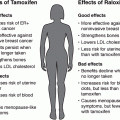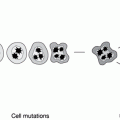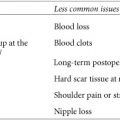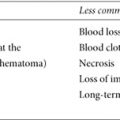Chapter 13
Dealing with Menopause and Quality-of-Life Issues
OUR OVARIES PRODUCE about 90 percent of the estrogen, progesterone, and other reproductive hormones that keep our bones strong, provide some protection from heart disease, boost metabolism, and regulate the menstrual cycle. During our reproductive years, these hormones also increase sex drive, support pregnancy, and affect other critical body functions. For most women, menopause is a natural transition when the ovaries stop releasing eggs, menstrual periods cease, and our bodies make less estrogen and progesterone. Although other organs continue to produce small amounts, the overall level of circulating hormones is drastically decreased.
Women experience menopause on average at age 51. It can occur prematurely as a result of pelvic radiation, some gynecologic surgeries, certain chemotherapy, and some medications used to prevent or treat breast cancer. It may also occur for unknown reasons. Some women view menopause as a sorrowful ending to their youth, while others welcome its liberating aspects: no more menstrual cycles or worries about birth control. Young women who experience premature menopause after BSO may grieve the abrupt end to their fertility, yet even women in their fifties or older may experience a sense of grief and loss after surgery.
Symptoms of Surgical Menopause
Most women begin having symptoms a year or more before their periods end, as their estrogen levels gradually decline and fluctuate. This perimenopause may last a few years until menstruation stops completely, signaling the end of fertility. Having oophorectomy before natural menopause produces the same effect, bypassing the gradual transition of perimenopause and abruptly stopping hormone production—it can take days or weeks for most hormones to be removed from the body. Some women have no menopausal symptoms at all or find them to be only mildly distracting. For others, menopausal side effects are severe. Because surgical menopause is immediate, it sometimes causes symptoms that are more intense than those of a women experiencing natural menopause. If you’re already menopausal when you have oophorectomy, you’ll likely experience no change at all.
Hot Flashes
Hot flashes—episodes of mild to extreme heat throughout the body—are the most common side effect of menopause and are sometimes accompanied by heavy perspiration, a flushed face, or a rapid heartbeat. Your hot flashes may occur for just a short time after surgery, or they may come and go for years. They can be unpredictable and inopportune, occurring at work, in the car, or when you’re with friends, so it’s helpful to be prepared. Until they lessen—they eventually do—dress in layers. Notice whether spicy foods, alcohol, caffeine, or some activities trigger your hot flashes. Combat night sweats (hot flashes while you sleep) that can interrupt restful sleep by keeping your bedroom cool and well ventilated. Put a fan over your bed. Open the windows. (Partners or husbands can use an extra blanket or flannel bedclothes if they’re cold.) Wear loose cotton bedclothes (or none at all) to promote circulation. Or tuck a Chillow, a soft, cooling pillow, into your pillowcase.
If anxiety appears to induce your hot flashes, try exercise, yoga, meditation, and other stress-management techniques. Some women say herbal supplements minimize their symptoms; no scientific data back this up. Despite Internet myth, dong quai, ginseng, black cohosh, and red clover haven’t been proved effective either. Herbal preparations can be expensive, cause side effects, and may adversely interact with certain medications. Many contain concentrated amounts of plant estrogen, which may have the same effect as natural estrogen. Nor are herbal preparations regulated by the FDA; you don’t know if you’re getting the dosage or even the ingredients listed on the label.
Though vitamin E is often touted as a remedy for hot flashes, studies show it’s ineffective, and it can slightly increase the risk for bleeding in certain women. Low-dose selective serotonin reuptake inhibitors (SSRIs), including the common antidepressants Paxil, Prozac, Effexor, and Lexapro, can lower the frequency and intensity of hot flashes in many women. They can also have side effects. They may reduce sex drive, and some (especially Paxil and Effexor) are associated with weight gain, so they may not be the best choice for all women. Some women find that exercise helps to reduce the frequency and intensity of hot flashes and helps promote deep and restful sleep. Estrogen replacement therapy (ERT) is the only medication specifically approved by the FDA for treating hot flashes.
Vaginal Dryness and Atrophy
The walls of the vagina are coated with a natural layer of moisture that increases and lubricates vaginal tissues when you’re sexually aroused. After menopause, this moisture is secreted less frequently. Vaginal tissues may atrophy, or become thin and dry. In this condition, they can easily tear, bleed, or become infected. Atrophied tissue makes intercourse and even a Pap smear or vaginal exam painful. Douching can further dry the vagina. Frequent sexual stimulation will increase vaginal blood flow. Specially formulated over-the-counter vaginal lubricants make intercourse easier, and applying vaginal moisturizers or vitamin E oil relieves overly dry tissues. If your vaginal symptoms persist, ask your doctor about a prescription for a vaginal cream, tablet, or ring that releases small amounts of weak estrogen to the vaginal walls but minimizes absorption into the bloodstream. If you still have your uterus, ask your physician about progesterone creams that provide relief while protecting against uterine cancer risk.
Decreased Libido
Two hormones that affect a woman’s sex drive, estrogen and testosterone, are significantly reduced after menopause. Many women continue to enjoy sexual intimacy. Others feel decreased sexual desire. Some physicians prescribe testosterone supplements to improve libido; it’s unclear whether testosterone is as safe or even safer than estrogen. A small study found that bupropion (Wellbutrin) improved sexual arousal and satisfaction with intensity of orgasm when compared to placebo.1 Another study showed that Wellbutrin increased satisfaction with sexual function among women who were treated with hormonal medications for breast cancer.2 Neither research included women who had surgical menopause.
Changing certain lifestyle factors can often improve the situation. Suffering from hot flashes and feeling exhausted from lack of sleep can certainly diminish your libido. Worrying about your cancer risk, overall health, or other issues can also stifle sexual desire. You may need to change your approach to sex and intimacy to get the result you want. Good communication between you and your partner is essential, and making time for sex, finding new sources of arousal, and using methods other than intercourse are all possibilities. If all else fails, consider a visit to a sexual dysfunction expert.
Sleep Disturbances
Insomnia is a common complaint during menopause. It may be related to night sweats or other symptoms that disturb a good night’s sleep. If you can’t sleep through the night, especially if you have night sweats, you’re better served by finding the cause of the problem rather than treating the symptoms. Avoid meals two or three hours before bedtime and cut down on or eliminate alcohol and caffeine. Exercise daily, but not within three hours of bedtime. Try to get to bed at the same time each night. Experts recommend that you read or do whatever makes you drowsy if you can’t sleep after fifteen to twenty minutes. If you still need help to get a good night’s rest, talk to your doctor about short-term medication, or consult with a sleep disorder clinic. Two unregulated supplements, valerian and kava, are popular sleep aids. Studies of valerian have produced inconclusive results; it does appear to improve sleep with few side effects if used in the short term. Kava can cause liver damage and should not be used.
Fatigue
Women frequently report feeling tired during menopause. If you’re not getting adequate sleep, that may be the problem. A short nap during the day can help you recharge. Try not to sleep for more than an hour (just thirty minutes of napping can leave you refreshed) or after 3:00 p.m. Getting plenty of exercise, eating well, and tackling problems that interrupt your sleep should help you feel more energized. If you experience persistent fatigue, talk to your doctor about blood tests to rule out low thyroid or other conditions that may be the cause.
Mood Swings and Depression
It’s not unusual to experience a range of feelings after oophorectomy. You may feel relieved because you’ve reduced your cancer risk, or sad and anxious about your long-term health, your remaining risk for cancer, or your loss of fertility. All these feelings are normal, and they’re all okay, as long as negative emotions don’t linger or interfere with your life. You may be happy one minute, and crying the next, for no apparent reason. St. John’s wort may improve minor depression much like standard antidepressants do—study results have been inconsistent. But it may cause nausea, increase sensitivity to sun exposure, and interfere with aspirin, Coumadin, and other blood-thinning medications. Understanding why you feel the way you do is the first step to managing your emotional upheaval. A healthcare professional can help determine underlying physical causes of mood changes. If you feel severely depressed, it’s very important to seek professional help. A mental healthcare professional can help you sort through your emotions and their causes and prescribe short-term medication if you need it.
Stay updated, free articles. Join our Telegram channel

Full access? Get Clinical Tree








